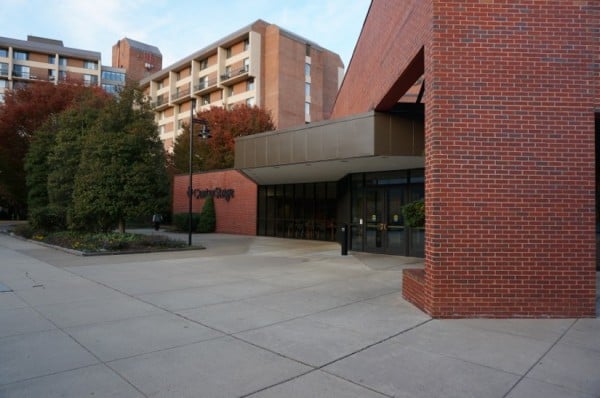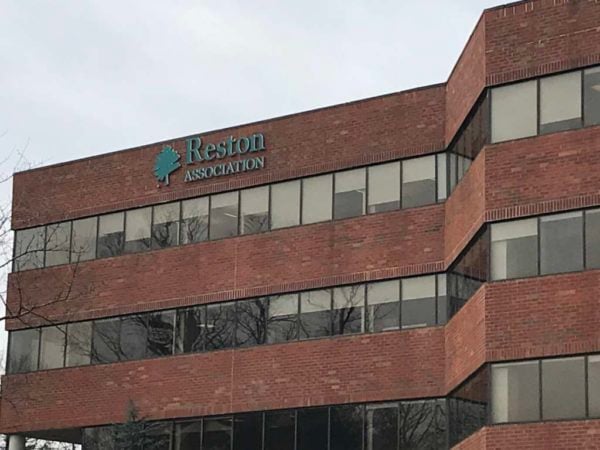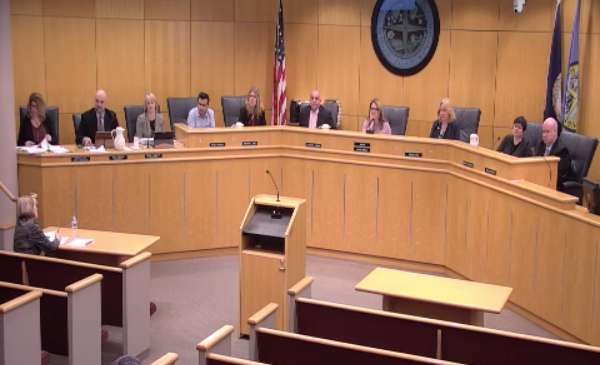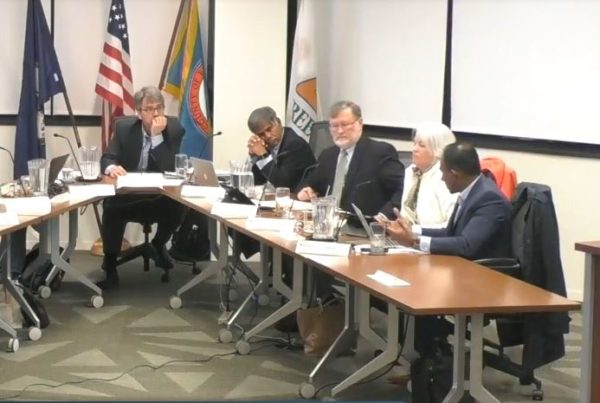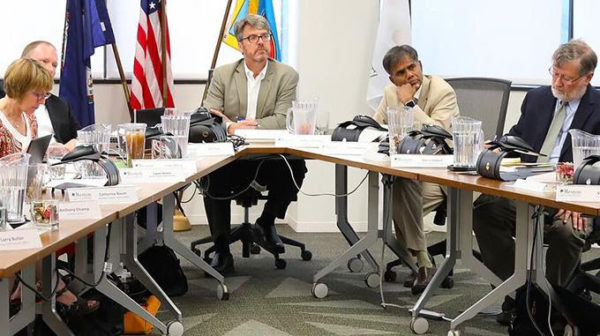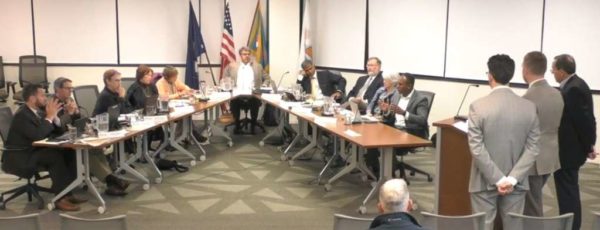Search Results for "budget"
Reston Association’s Board of Directors and its fiscal committee will meet later this month to discuss the first draft of the 2020-2021 budget.
The meeting, which is open to the public, is set for August 21 at RA headquarters (12000 Sunrise Valley Drive) at 6:30 p.m.
The budget process kicked off on May 23 when the board adopted the budget development calendar.
Later this month, RA’s staff will incorporate changes made to the budget from the meeting to form the second draft of the budget.
A public hearing on the second draft is set for September 26. The budget will be formally approved on November 21.
Photo via Reston Association/YouTube
Reston Community Center’s Board of Governors is holding its annual public hearing on programs and budget next week.
The meeting is set for Monday, June 17 at 6:30 p.m. at RCC Hunters Woods (2310 Colts Neck Road).
During the meeting, the public will get a glimpse of RCC’s plans for the future and highlights and challenges over the past year.
Attendees will also receive the center’s annual report and strategic plan for 2016-2021.
A nine-month renovation of the Terry L. Smith Aquatics Center is underway. The 40-year-old center will get two pools — a 25-year lap pool with zero-depth entry and a warm-water therapeutic pool — along with a new roof.
The renovated facility is set to reopen in October.
RSVPs are requested by emailing [email protected] by Friday, June 15. Attendees should include their full name and address.
RCC is governed by a nine-member board appointed by the Fairfax County Board of Supervisors. Selections are based on the preferences of residents and businesses in Small District 5, which the center serves.
File photo
Reston Association’s Board of Directors is seeking suggestions from members on the upcoming 2020-2021 budget.
The development of the budget process kicked off on May 23 with the adoption of the budget calendar.
For the rest of the year, RA’s board, staff and members will draft the upcoming budget, which heads to the board for approval in November.
The budget approval schedule is available online. Tentatively, public hearings are set for Sept. 26 and Oct. 24.
RA runs on a biennial budget divided into two parts: the operating budget and the capital budget. Assessments rates are calculated based on the total spending allocation for both budgets.
Members can fill out the suggestion form — which is available online — and email to [email protected]. The deadline for submissions is Tuesday, June 18.
File photo
The Herndon Town Council adopted a $53.9 million budget this week for fiscal year 2020, representing a 10.4 percent decrease over last year’s budget.
Although real estate taxes were unchanged this year, the town’s meals tax increased from 2.5 to 3.75 percent — a move that town officials said was necessary to fund capital improvements, the Herndon Police Department’s operations, an assistant town attorney position, and restoration of parks and recreation programs.
Fiscal year 2020’s recurring expenditures increased by 2.2 percent over last year from $35.2 million to $36.3 million. Overall, expenditures increased nearly 3 percent over last year.
Other taxes like the cigarette tax and business professional and occupational license tax remained unchanged. The water service rate increased from $5.87 in FY 2019 to $6.19 per 1,000 gallons of water consumption in FY 2020.
Recycling fees doubled from $16 to $32 per year. Personnel costs also increased by $805,359 over last year, totaling nearly $28.1 million of the overall budget.
Town officials said that this year’s budget continues to prioritize Metro planning, downtown redevelopment, the efficiency of town operations and capital improvements.
“We appreciate everyone who called, emailed, and provided in-person comments throughout the budget deliberation process,” said Mayor Lisa Merkel. “The newly-adopted budget funds the programs and service our citizens have told us are important to them.”
The next fiscal year runs from July 1 of this year to June 30, 2020.
Photo via Town of Herndon
The Town of Herndon revealed its proposed budget today (April 1) along with publicizing two public hearing dates to receive feedback.
Totaling a little more than $53 million, Herndon Town Manager Bill Ashton’s proposed fiscal year 2020 budget is a 10.9 percent decrease from the adopted FY 2019 budget, according to a press release from the Town of Herndon.
“In a ‘status quo’ economic environment, the proposed FY 2020 Budget funds Town Council priorities, such as the redevelopment of Herndon’s downtown as well as continued planning for the coming of Metrorail,” Ashton said in the press release. “It also recommends continuation of the services and programs our citizens expect and enjoy.”
The town’s FY 2020 begins on July 1 and runs through June 2020.
Here is a quick overview of the proposed budget:
- real estate tax, personal property tax rate and cigarette tax remain the same
- town’s meal plan increases from 2.5 percent to 3.5 percent
- motor vehicle license fee remains at $25 for private passenger and other vehicles weighing less than 4,000 pounds and $32 for ones weighing more than 4,000 pounds
- sewer service rate increases from $5.78 to $6.19
- sewer and water availability fees for new, single-family homes and sewer lateral repair and replacement program remain the same
- water service rate increases from $3.06 to $3.16
- recycling fee increases from $16 per year to $32 per year
The public hearings are set for April 9 and April 23 — both Tuesdays — and will start at 7 p.m. in the Ingram Council Chambers (765 Lynn Street). In addition to the hearings, locals can submit feedback online.
Residents and businesses in Herndon can expect to receive a guide to the budget mailed to them.
Photo via Town of Herndon
 This is an opinion column by Del. Ken Plum (D), who represents Reston in Virginia’s House of Delegates. It does not reflect the opinion of Reston Now.
This is an opinion column by Del. Ken Plum (D), who represents Reston in Virginia’s House of Delegates. It does not reflect the opinion of Reston Now.
Increases in budget revenues as a result of federal tax changes and the ability to tax sales on goods purchased on the internet put Virginia in a unique position to increase its budgeted funds mid-year of a biennial budget while at the same time providing many taxpayers with refunds.
As the fall elections approach, the actions on the state budget will receive many different “spins.” Certainly, taxpayers like getting money refunded. At the same time they recognize when programs to meet needs are underfunded, they may over a period of time become even more underfunded. It is more than mathematics and accounting to approve a budget when revenues have increased — it is also very much an expression of values on the part of decision makers.
An example of values affecting budgetary decisions came during the Great Recession of 2008. State revenues dipped at the greatest rate in modern times just as many businesses faltered and failed. A great bail-out went to businesses from the federal government as did major funding to state government. The feds did not match the private losses, but they did provide relief for some greater cuts for programs like education.
Only now has the Virginia economy recovered such that the funding of education today is exceeding that of pre-2008 levels.
Beyond simply funding programs and services with more money next year than last year are the equity issues involved in distributing money across programs. My trip to Prince Edward County as I described in my column last week reminded me just how inequitable funding can be. There was no pretense of equity among black and white schools. The whites went to a brick school that was modern for its time; the black children went to school in a tar-paper shanty. With many federal court decisions we have gotten beyond the inequities of segregated services and programs, but inequities still exist.
The budget presented to the General Assembly by Gov. Ralph Northam represented the greatest attempt at resolving equity issues that I have seen. Funding for schools was increased but with those who had the greatest needs receiving the most money. Programs for students with special needs were enhanced as was funding for historically black institutions of higher education. The governor found himself with a major problem pushing his agenda as he got himself in political hot water for his behavior many years ago. Whatever way that situation is resolved, it need not take attention from the basic problem of increasing equity among school divisions, mental health programs and criminal justice programs.
There is ample evidence gleaned from numerous studies that document inequities that exist in the state’s budget. These facts will be manipulated among candidates this election season to gain the advantage, but candidates need to acknowledge that inequities exist and must be dealt with fairly. I understand that most regions feel that they do not get a fair shake. There are metrics that can be used to find the inequities; once resolved the state will be stronger because of it.
File photo
The Reston Association’s Board of Directors are set to discuss truncating its biennial budget processes at its meeting tonight (March 21).
Treasurer Eric Carr and Chief Executive Officer Hank Lynch are scheduled to present a proposal that would shift the Reston Association to an annual budget cycle.
Currently, RA’s budget process has an intense first year that calls for community projects, benchmarking programs and more the budget gets developed in the second year.
Carr and Lynch will tell the board that the current process does not provide RA the flexibility to make changes to the budget on an annual basis, according to their presentation.
A new timeline would propose the following:
- June: RA Board has budget conversations for next year’s priorities
- July: Staff presents the first draft of the budget, and RA sends the accepted draft to the Fiscal Committee
- November: Staff presents the final draft of the budget
Ultimately, the proposed change aims to free up more time for other issues by tightening the budget process. The presentation notes, however, that the board will have to be disciplined and fully engaged in order to succeed.
The meeting is set to start at 6:30 p.m. at RA’s headquarters (12001 Sunrise Valley Drive).
The draft agenda for the meeting is available online.
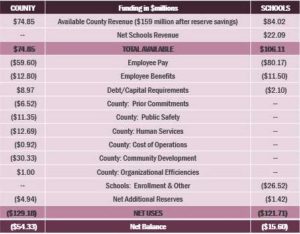 This month marks the beginning of Fairfax County’s fiscal year 2020 budget process. Locals in the Hunter Mill District can attend a town hall in Herndon on the first Saturday of March to get more information on the proposed budget plan.
This month marks the beginning of Fairfax County’s fiscal year 2020 budget process. Locals in the Hunter Mill District can attend a town hall in Herndon on the first Saturday of March to get more information on the proposed budget plan.
Projections expect the county’s revenue to grow by 2.9 percent, generating more than $156 million in additional revenue for FY 2020, according to the county.
The town hall is set to take place from 8:30-11 a.m. on March 2 at Frying Pan Farm Park Visitor Center (2709 West Ox Road).
Hunter Mill District Supervisor Cathy Hudgins, County Executive Bryan Hill and Fairfax County Public Schools staff will give the presentations, according to Hudgins’ newsletter.
After coffee and a conversation starting at 8:30 a.m., the elected officials and county staff will be available to answer questions.
The next steps in the budget process include posting the proposed tax rates, followed by public hearings in April held by the county’s Board of Supervisors.
The FY 2020 fiscal year begins on July 1.
Image via Fairfax County

(Updated 12:20 p.m.) Reston is home for Charles and Julie McCool, but more often than not you’ll find them on the road.
The Reston couple runs the travel blogs McCool Travel and Fun in Fairfax VA. Charles’ blog is dedicated to maximum travel with minimum expenses. Charles currently has 21,594 followers on Twitter, while Julie has 12,057 followers.
Emailing from a chair once occupied by Jimmy Buffet in Pascagoula, Charles shared some travel tips for Restonians hoping to see the world on a shoestring budget.
Charles said he worked in a cubicle office space in downtown Washington D.C. until 2.5 years ago. Since then, Charles says he’s been traveling full-time and working remotely.
“My personal budget was tight so I heavily researched ways to stretch my dollar but optimize my travel opportunities,” said Charles. “This year my wife and I have flown to Copenhagen and Ecuador for free (using credit card points).”
Charles also notes on the blog that links in the articles may be affiliate links which pay a commission, and that the site is an affiliate of Amazon’s advertising program, meaning the site earns advertising fees for links to Amazon.
Recent features on the McCool Travel blog include dining recommendations around Gettysburg and website recommendations to help prepare for trips. Julie McCool’s blog features more local free outings, like Ten Free and Fun things in Washington D.C.
One of Charles’ top recommendations is for travelers to be flexible.
“Being flexible is my number one rule of travel,” said Charles. “When someone locks in the idea of taking a certain trip at a certain time, that inflexibility often leads to higher prices. For instance, going to Disney World in mid-June (after school is out) or the Caribbean for Spring Break; those are peak travel experiences. Being flexible means, in these cases, maybe doing a road trip to US National Parks.”
On some of the more bare-bones trips, Charles says little touches like getting food from grocery stores instead of fine restaurants can help make a difference in the travel budget.
On a post about lodging, Charles recommends looking for house-sitting opportunities, volunteering, or working at a place that offers residence. Charles noted that farms, lighthouses, and resorts can all offer lodging for work in off-seasons.
If you have to pay for lodging, Charles says identifying which locations offer breakfast can help reduce meal costs, and inquiring about a refrigerator to store groceries can reduce that further.
Charles said his next big trip planned won’t be until a June cruise, but he’s looking into bicycling from Houston to Key West in March or April.
“You do not have to invent, or re-invent, the wheel,” said Charles. “No matter where you want to go, and how you want to do it, there is undoubtedly someone who has already done so (and most likely has a travel blog to talk about it). General suggestions include reading various travel blogs and websites (like mine), be involved in Facebook and Twitter discussions, find people doing what you want to do and ask them for advice.”
Photo via Twitter
Reston Association’s Board of Directors approved next year’s budget, which increases the assessment fee by $11, at last night’s meeting. The Thursday meeting focused on finalizing the $17.9 million budget for next year and setting the assessment fee to the new rate of $693 — a bump from last year’s $682 fee.
Larry Butler, RA’s Acting CEO, presented his recommendations for the budget before the board took a deep dive into the budget.
The long-vacant CEO spot — one of several unfilled positions, including CFO and Planner — loomed over the board’s budget deliberations.
RA At-Large Director Ven Iyer, who unsuccessfully attempted to keep next year’s assessment fee the same as last year’s, argued that keeping costs low sets a good example for whoever fills the CEO spot. “What happens if the CEO comes in and says, ‘Actually, the costs need to go up’? What would you do if that happens?” Iyer said. “I think we need to set the tone.”
RA President Andy Sigle said that RA needs a CEO’s “fresh eyes to keep pushing for more efficiencies.”
Quite a bit of confusion around the operating reserves dominated the discussion as well. Ultimately, the association trimmed roughly $280,000 from initial expense estimates from the first draft of the budget, which allowed the association to limit the assessment increase to 1.6 percent.
“Our job is not, not to spend money,” said John Mooney, secretary of the RA, said at the meeting. “We can’t do everything everyone wants… The question is not expense, it’s value.”
In an effort to pass expenses shouldered by RA, the board also green-lighted a measure to start passing on credit card fees for purchases made through WebTrac to members beginning Jan. 1. Members who purchase pool and tennis passes or activity registrations through the website will be charged the credit card service fees.
Assessment-related credit card transaction fees will also be passed on to members starting in 2020. RA also directed the association’s staff to increase employee health insurance contributions.
The RA will mail assessment packets by the end of the first week of December to residents with information about the fees and funding. The payment will be due Jan.1, and a six-month installment plan will be available. Late fees for assessment payments kick in after March 1.
Photo via Reston Association/YouTube
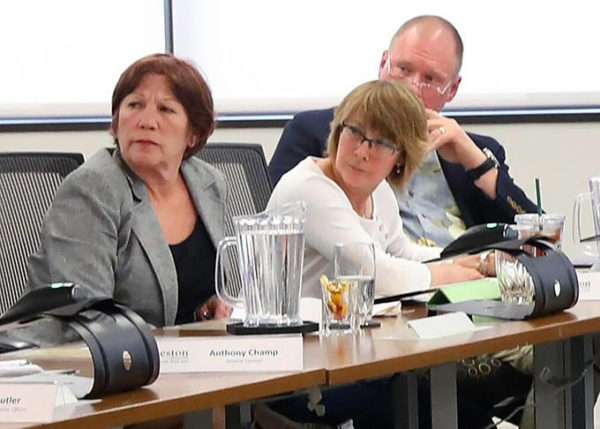
Reston Association is set this week to hold a vote and the second public hearing on next year’s budget.
This upcoming meeting will focus on approving the second year of the 2018-2019 budget at the public meeting tomorrow (Thursday) at 6:30 p.m. at RA’s headquarters (12001 Sunrise Valley Drive) after the first year of the budget was approved last year.
Larry Butler, RA’s acting CEO, presented his recommendations for the budget at a public hearing last Thursday (Nov. 8). RA board and staff created three drafts of the budget, using 2018 as a baseline.
During the budget process, the RA board directed the association’s staff to increase employee health insurance contributions and to reduce expenses by passing credit card convenience fees along to the cardholder. The association trimmed roughly $300,000 from the initial budget estimates from an earlier draft, according to a Nov. 1 press release.
“This year’s budget was shaped primarily through a wide range of cuts in operating expenses,” the press release said.
If approved, the proposed budget would increase members’ assessment fee by $11, setting the rate at $693. The first draft would have set the annual fee, which helps the association maintain pathways, facilities and recreational areas, at just over $700. Last year’s totaled $682.
The board is also requesting $40,000 from cash reserves to reinstate staff training and $17,545 for staff recruitment and “market rate adjustments for difficult to fill positions,” according to meeting materials to be presented to the board.
After the new assessment is set by the board, RA will mail assessment packets to residents with information about the fees and funding. The payment will be due Jan. 1.
The draft agenda for the meeting is available online.
Photo via Reston Association/Reston Today
As deliberations on next year’s budget continue, Reston Association is holding a public hearing to get feedback from members next week.
The hearing is set for Nov. 8 (Thursday) at 6:30 p.m. at RA’s headquarters (12001 Sunrise Valley Drive). The draft budget is available online and includes a possible $28 increase in assessments.
RA’s Board of Directors is also contemplating a number of policy directives, including passing on credit card fees for processing members’ and nonmembers’ payments from the organization to individuals. Other issues before the board include expanded health benefits for employees, overall compensation packages and merit-based salary increases.
The first year of the 2018-2019 budget was approved last year. The second year will be approved by the board in mid-November.
Photo via Reston Association/YouTube
After hearing a detailed presentation of the Hook Road Working Group’s Master Plan, Reston Association board members on Thursday night voted to include $50,000 in the 2019 budget for architectural, engineering and design work to help the project move forward.
Featuring improvements on everything from play areas to permanent bathrooms to traffic calming measures, HRWG members Stu Gibson and Aaron Webb, along with capital projects manager Chris Schumaker, provided a detailed presentation of the master plan Thursday night, with special emphasis on the priorities they identified through public engagement meetings over the past year.
The first priority the group identified was public safety. Members suggested adding “bump-outs” to Fairway Drive that would narrow the road at certain points and act as a natural traffic calming measure, by forcing cars to slow down in order to navigate through the narrowed sections. While the bump-outs would require approval from the Virginia Department of Transportation (VDOT), Gibson said VDOT would be identifying its own needs in order to accommodate the newly designed park, so the idea would be to try and piggy-back on any improvements VDOT will want to make.
Other priorities identified by members of the community and working group alike included better lighting for the tennis courts.
The second proposed improvement also had to do with safety. The group proposed pushing the park’s two baseball diamonds closer together and further into the park. Gibson said this would add an extra layer of protection for cars in the parking lot, making it harder for balls to fly that far and potentially hit vehicles, as well as push spectators further back from the road and away from cars.
“This will also afford the community an extra layer of accessibility that is not enjoyed now, while also preserving the tree line,” Gibson explained to the Board. “The community was adamant about not wanting to disturb that tree line, which basically bisects that part of the park down the middle.”
Gibson said another priority that countless members of the community asked for was the installation of a permanent bathroom, to replace the aging porta-potty that sits there now. The group proposed the creation of a new building that features a covered picnic pavilion on one side, with two permanent bathroom stalls on the other side.
The only question about the proposed bathroom was whether or not the RA’s budget can afford the costs of water and sewer work. Two alternate options could be to create a “waterless bathroom,” or a bathroom that is only open 9 months out of the year, and would be closed during the freezing-cold winter months.
Finally, the fourth priority the group identified were improvements related to accessibility and open space. The group proposed building a path along the west side of the tree line to allow increased access to the southeast baseball diamond from Fairway Drive, as well as a limited, five-degree slope from the Hook Road side to allow access by people in wheelchairs. They also proposed a “natural playscape” in added open spaces for children to play outdoors.
Following the presentation, the Board voted unanimously to direct RA staff to include the $50,000 in funding in the 2019 capital projects budget for the necessary architectural, engineering and design work to move forward with the Hook Road Master Plan. The funding will reportedly pay for work to acquire estimates for the design and construction of the features in the plan.
Photo via YouTube/Reston Association
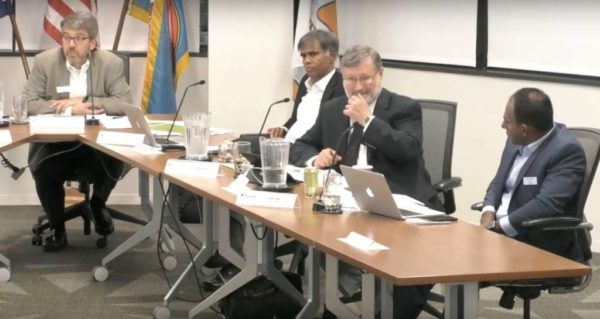
Reston Association’s Board of Directors took a deep dive into drafting next year’s budget, which could include a roughly $11 increase in member assessments.
The proposed increase, which is currently under consideration, is driven by nearly $229,000 in new expenses, such as a $60,000 reserve study required by state law every five years and nearly $56,000 in health care cost increases for staff.
At a meeting in late September, the board took particular interest in $20,000 allocated for targeted marketing in an effort to reach individuals outside of RA’s membership and boost rentals of facilities. Mike Leone, RA’s director communications and community engagement, said would allow staff to expand their reach and market RA’s rental facilities, including the Lake House.
In previous years, staff used free marketing tools to reach members and non-members. Board members said they wanted to see more information on how targeted marketing was linked to revenue increases and return on investment.
“This board will need to see more granularized targets,” said RA board president Andy Sigle.
RA’s Acting CEO Larry Butler said he directed department heads to examine how to cut costs across different entities within RA.
“They’re very, very small compromises,” Butler said.
New proposed items in this year’s budget include the following:
- Reserve study: $60,000 of a study required by law every five years
- Healthcare cost increase: $55,500 for a projected 6.5 percent increase in current healthcare funds
- POAA software: $43,000 to eliminate proprietary software
- Dechlorination systems for pools: $20,000 to fulfill a new Fairfax County requirement to address stormwater concerns
- Billings and collections software: $30,000 to replace an antiquated proprietary system; will utilize a $75,000 in carry-forward funds from this year
Photo via YouTube/Reston Association
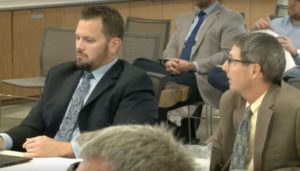 In a preliminary dive into next year’s budget on Monday, Reston Association’s Board of Directors and members of its fiscal committee explored ways to navigate a possible increase in assessments next year.
In a preliminary dive into next year’s budget on Monday, Reston Association’s Board of Directors and members of its fiscal committee explored ways to navigate a possible increase in assessments next year.
The increase may be necessary to offset additional expenses and new capital projects, according to RA officials. A major driver of expenses is a $50,000 increase in health insurance premiums for staff and $215,000 to pay for unanticipated lease payments for the lease of RA’s headquarters. Although staff hiring savings of $90,000 are expected to offset some expenses, the association has also seen an increase in lawsuits, amounting to roughly $30,000. Revenues from the Lake House and tennis courts are also down, said Larry Butler, RA’s Acting CEO.
Other expenses include a $60,000 state-mandated reserve study, $40,000 in software updates, $44,000 to add dechlorination systems for pools, $30,000 for a new billing and collections software and $20,000 for targeted marketing. The dredged of Lake Audubon, which was pushed from this year to next year, is expected to cost $850,000. Projected cost estimates for improvements to Hook Road are also expected to be a major expense next year.
Butler pitched several budgeting strategies for next year’s budget. On the top of the list is a proposed 2.5 percent in membership dues or annual RA assessments. Other alternatives include cutting expenses by 2.5 percent, dipping into investment earnings for $35,000, and the use of RA’s operating reserves.
RA Board President Andy Sigle suggested that staff continue to explore ways to balance the budget with RA’s operating reserve, which was also used to pay the Lake House loan. A stronger understanding of the projected year-end balance for the operating fund was necessary to determine whether or not to increase assessments, Sigle said.
Board member Julie Bitzer also stressed the need to ensure budgeted amounts are conservative and realistic, citing that RA budgeting for a decrease in lease payments for its headquarters location, only to later discover a decrease was not expected.
RA staff and the board will take a second dive into the budget by presenting draft two of the budget in late September. Following a series of listening sessions with members, the fiscal committee will receive the budget in late October. The budget is approved at a November meeting by the board following additional member input opportunities and amendments.
Photo via Reston Association



